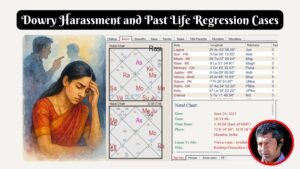The Unconquerable
Article by Saptarishis Astrology
Neither the hope of wealth nor concern that it may be lost will turn good people away from charity. Thus has it been heard:
As a Bodhisattva, the Lord was once a merchant prince of a good family. He had many virtues. He was liberal and honest, humble and modest, learned and wise. In affluence he was like Kubera, the god of wealth. Hospitable to everyone and always engaged in works of charity, he was devoted to the public good and a most excellent almsgiver. As he never succumbed to selfishness and other vices, he was well known by the name Avishahya or the Unconquerable.
Both he and his supplicants delighted in meeting each other. Neither had any doubt that their wishes would be fulfilled. He could never refuse a supplicant, for compassion left no room in his heart for clinging to wealth. Knowing wealth to be a cause of great calamities, and liable to perish, he was overjoyed when supplicants took it away from his house.
Shakra, the king of the gods, was amazed to hear of his generosity and charity. Wishing to test the firmness of his resolve, the celestial ruler caused some of Avishahya’s reserves of bullion and grain, jewelry and apparel to disappear every day. Concern at the depletion of his wealth, Shakra thought, may tempt the merchant prince to be selfish. But the great man was committed to giving alms. No sooner than his goods vanished like drops of water drying in the sunlight, did he bring out even more for gifting, almost as if his house were on fire.
Shakra’s astonishment continued to increase as the merchant prince remained intent on charity despite the erosion of his assets. At last, one night the king of the gods caused all of Avishahya’s wealth to disappear, bur for a single sickle and a coil of rope.
Next morning, on waking up as usual, Avishahya beheld his mansion, emptied of all its contents. There was no money, food or apparel, nor any servants. The house was a melancholic sight, silent and desolate, as if it had been ravaged by demons. He went around it, wondering how this could have happened, and found that only a sickle and a coil of rope remained.
‘Has someone, used to earning a livelihood by his own efforts, and unaccustomed to begging, thus shown favour to my house?’ he wondered. But if, instead of being utilized, it has simply been destroyed by someone who could not bear to see me flourish, it is then my bad luck and a great pity. I always knew that fortune is fickle, but what pains me is the trouble this will cause to my supplicants. Long used to the ease of courteous charity, they will be like thirsty travellers at a lake gone dry.’
But Avishahya’s calm composure left no time for dejection and distress. Himself unused to begging, he could not bear to solicit others in his present condition, not even those whom he knew well. He understood how hard this could be, and it increased his compassion for supplicants even further. In order to welcome them suitably, he took the rope and sickle in hand and would every day gather grass, by selling which he could earn something for attending to those who came to him for alms.
Shakra observed that, even in absolute poverty, this great man did not give way to despair but remained intent on charity. Filled with wonder and admiration, the king of the gods then appeared in the sky in his marvelous celestial form in order to dissuade Avishahya from giving alms.
‘Master of the house,’ said Shakra, ‘your wealth has not been taken away by bandits or kings, nor lost by fire or flood. It is because of your excessive charity that you are in your present state, so distressing to your friends.’
‘Therefore I say to you for your own good: curb this addiction to charity. If you do so, even in your present condition, you will regain your former prosperity and splendor. Constant expenditure, even though in small measure, leads over time to the depletion of what has been earned. Accumulation, on the other hand, makes it grow like an ant hill. In view of this, discipline and restraint is the only way for those who wish to increase their wealth.’
But the prince extolled the practice of charity, and told Shakra:
‘O Shakra of the thousand eyes!
Ignoble deeds are hard to do
For the noble, even though
They may be in dire straits.
Therefore, may i never have
Such wealth, as for which I must be
A person who is miserly.
‘can a person, who is proud
Of his family’s honour, hurt
the sufferers who seek relief
From their lot of misery
In begging, which is hard as death,
With words of curt refusal, flung
Like thunderbolts from cloudless skies?
‘How can someone like myself?
Accept wealth, a horde of gems,
The rule even of paradise,
If they cannot help to brighten
The faces of my supplicants,
Ashen with the pain of begging?
‘Possession is a problem,
A disaster in disguise:
It increases selfishness
And not the generous spirit;
It deserves to be given up
By someone like myself.
‘Fleeting as a lightning flash,
Cause of many problems, and
A mean and petty thing is wealth.
But giving is a source of joy:
Which noble one will ever seek
Refuge therefore in selfishness?
‘Shakra, you have shown your sympathy for me with your words for my welfare,’ Avishahya continued. ‘I am gratified. But my heart has got used to the joys of giving. How can it be satisfied with a wrong path? Please do not be angry with me, for I have little strength to go against my own nature.’
‘O master of the house,’ replied Shakra, ‘the course you describe is all right for someone who has a high position, sufficient wealth, and various large enterprises well under way; whose treasury and granary are full, and whose future is assured. It is not appropriate for one in your condition. Look, one should first gain wealth through ones work, either by using one’s own wealth or by following family traditions of good reputation. Thus is the splendor of rivals surpassed, honour gained even from the king, and fortune’s much-desired favour won. From time to time one may attend to the people’s welfare and hearten friends and relatives. Nobody will point a finger if one then goes in for charity or the pursuit of pleasure. But wishing to give without having the means only brings trouble, as with the nestling which wants to fly before its wings have grown.
‘Therefore, restrain yourself and concentrate on earning wealth,’ Shakra added. ‘Meanwhile, put aside your desire to donate. There is nothing ignoble in not giving if you have no possession.’
‘Do not insist so much, Your Majesty,’ the prince responded.
‘Even when one’s self-interest
Seems greater than the good of others,
One should forswear wealth, and give:
For pleasures of prosperity,
However sweet, cannot compare
With the satisfaction which comes
In vanquishing one’s avarice
And giving all in charity.
‘Wealth alone leads not to heaven
Nor cures such ills as venality’
Giving earns both fame and merit,
So who will not do charity?
‘One who, moved by compassion,
Wants to save the world besieged
By age and death, is even willing
To give his very self for this’
And has no time to taste of pleasure
When others suffer: what will he
Do with this prosperity?
‘Moreover, O king of the gods,
Knowing that our life’s duration,
Like our wealth, is transient,
We should not care about our riches
When we meet a mendicant.
‘When a chariot marks out a track on earth, and other follows it, and the next one does the same with greater confidence. I am not inclined to spurn this good first road to follow a wrong path. If my wealth increases once again, it will certainly attract more supplicants. But, even in my present condition, I will give what I can. For, Shakra, may I never default in the practice of charity.’
Shakra, the king of the gods, was delighted at these words. Looking at Avishahya with great respect and affection, he praised him and said: ‘Excellent! Most excellent! People seek affluence, even by disreputable, base and terrible actions, because they are obsessed with their own pleasures, seduced by fickle minds and careless of the dangers involved. But you did not care for the loss of your wealth and comforts, or even for my temptations. You displayed your inner greatness by your steadfastness in wishing to help others. How your heart shines with generosity! It has been cleansed of dark selfishness and, even though your wealth is gone, the hope of its recovery has not spoilt you by making you reluctant to give.’
‘I could no more shake your resolve for charity, than can the wind the snow-white mountain peak,’ said Shakra. ‘And it is not surprising: such is your compassion that you grieve in the grief of others and wish well to the whole world. I hid your wealth only to spread your fame through this ordeal. For, even a splendid gemstone cannot attain the reputation and value of a jewel without being tested. Now, like a great cloud which fills up lakes, raining down your charity n supplicants. And forgive me for what I did. By my favour your wealth will never deplete again.’
Having thus praised the prince, Shakra restored his wealth and disappeared. So it is, that neither the hope of riches nor concern that it may be lost turns good people away from charity.











Leave a reply
You must be logged in to post a comment.